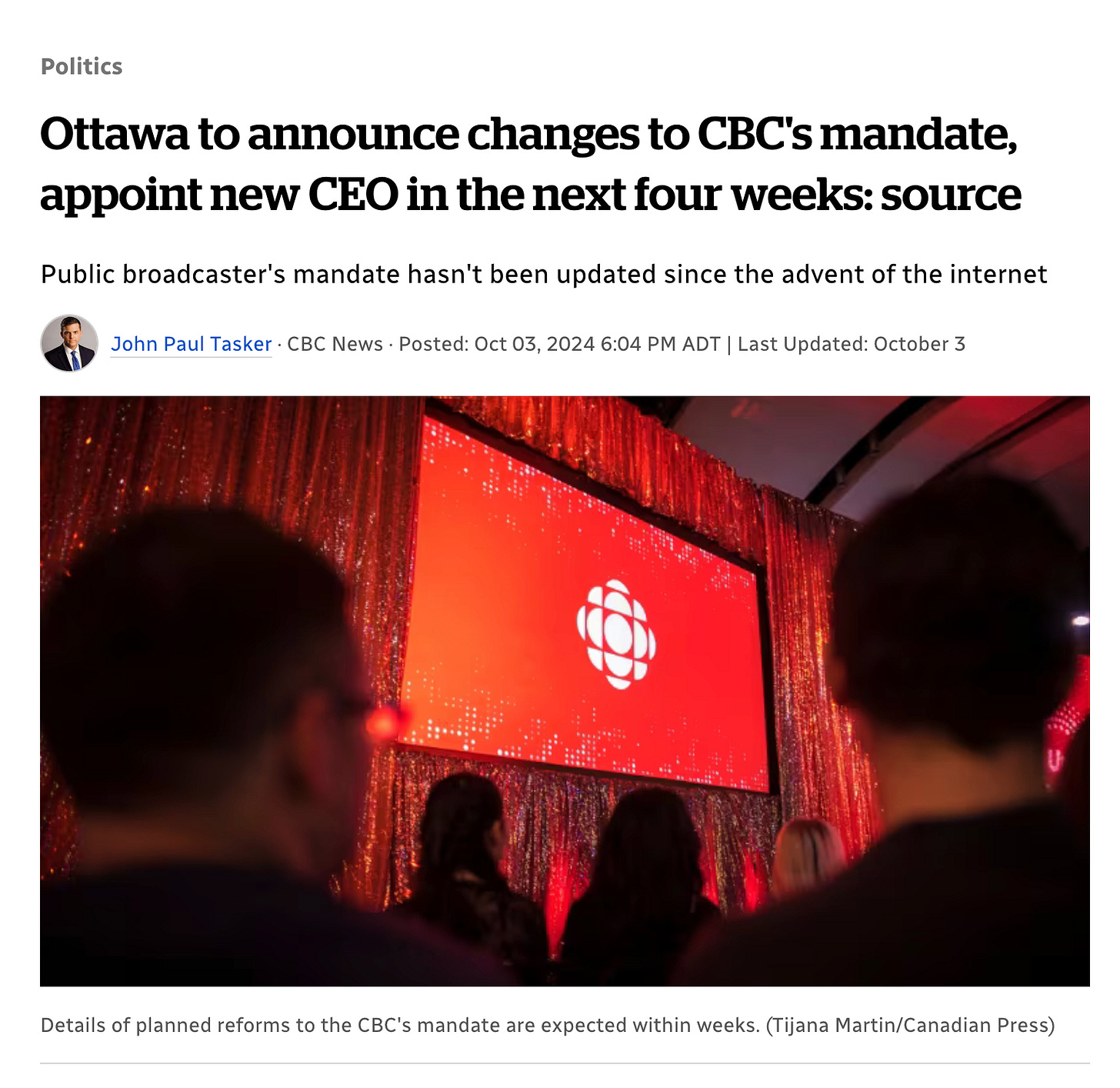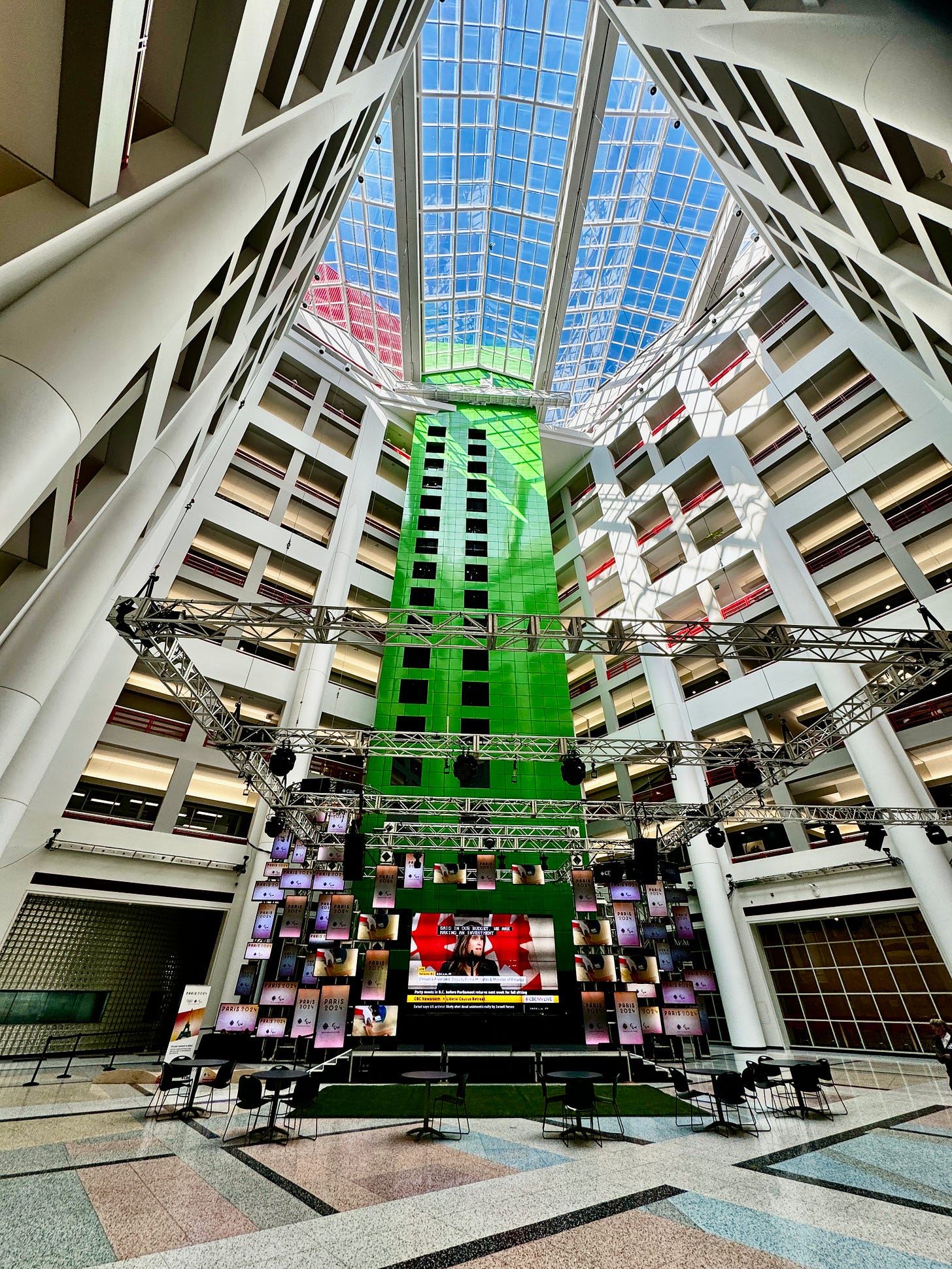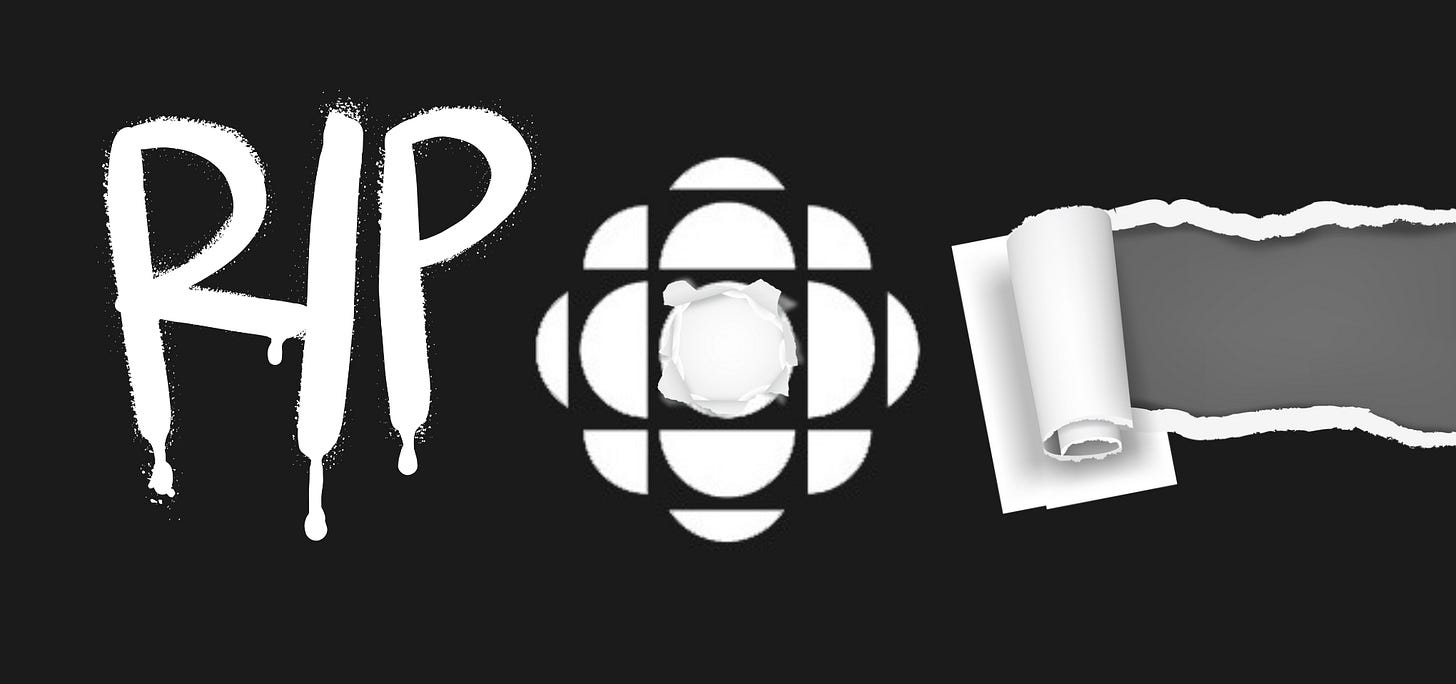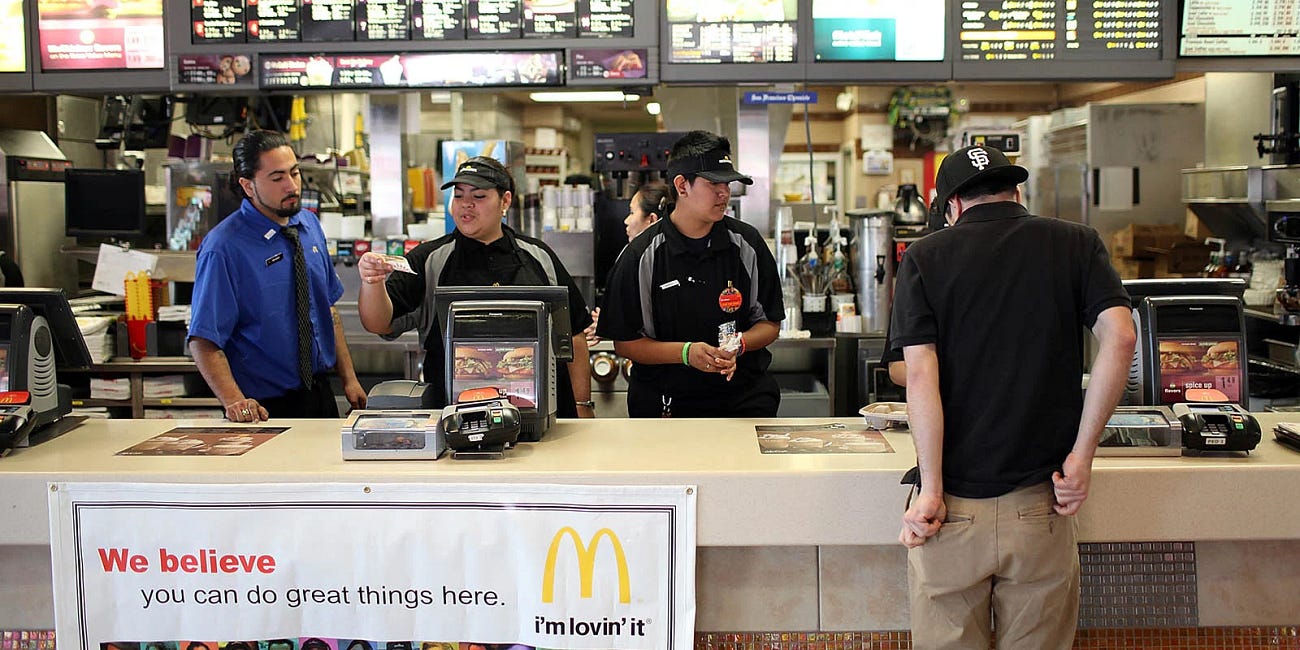You and Me, and the CBC: From Unity to Diversity
Once a national treasure, now a national lecturer—why the CBC thinks you need a lesson, not a story.
The CBC has gone from the voice of unity to the enforcer of division—how did Canada’s broadcaster become a preacher of repentance?
Is a NEW CBC on the horizon? This week it was leaked (to the CBC) that, after a long study, the government is set to announce a new direction and new mandate for the CBC. It was filed under politics.
I get to see the mission and work of the CBC from the frontline. Not just what they’re doing now but what they’re planning – what they want to do. It’s not secret. But, as an independent producer who has worked on projects for CBC over 25 years, I have a clear view from the front-row seats, without any bias of being part of the company.
What I’m not going to do in THIS essay is dive into the economics, finances, revenue streams, and issues of advertising and sponsored content, or compare CBC to other public broadcasters. All that and more can be discussed another day. This story is MISSION-focused.
But to clarify off the jump, I’m not a CBC producer. Probably less than 2% of my business over a lifetime as a Canadian producer of Canadian content has involved the CBC, and my expectation is that 0% of my future work will involve the CBC. YouTube algorithms and digital fast channel viewing trends in Italy, or southeast Asian interest in raccoons, will have more of an impact on my work than CBC’s management. My stake in all this is as a citizen.
In June this year I had a front-row seat when the Minister of Canadian Heritage told those assembled at the Banff World Media Festival that the next Liberal government would relook at the CBC - to consider how to depoliticize and decentralize the CBC. Interestingly, she didn’t explain at all what she meant by this, leaving only the impression that it needed to be done and that this was the Liberal alternative to the now very well-known platform position of the Conservative Party of Canada:
Defund the CBC
Well, sort of… The Conservative Party of Canada has been clear about its intention to reform the CBC if elected. Their platform includes plans to reduce the role of the CBC, particularly by focusing on privatizing or eliminating its English-language television services. They argue that the CBC has become politically biased and is no longer aligned with the public interest, advocating for a depoliticized and more efficient public broadcaster. They say that the new digital media platforms and internet have changed broadcasting fundamentally with basically no barrier to entry such that any Canadian with something to say can do it. With Canadians like Derek Muller having FAR bigger audiences on Youtube (Veritasium) and producing far more content than CBC ever could dream of, it’s hard to argue they’re wrong. The party also seeks to review CBC’s funding, aiming to shift it toward a more self-sustaining model.
More From the Front
This fall I was again among the front-row producers in the Canadian industry at Content Canada, an event meant to connect and talk about the evolving future of the TV industry, in Toronto when Catherine Tait, the head of the CBC, made her position crystal clear… diversity first, diversity now, diversity always, diversity ahead of all other considerations… apparently even her job, which she is about to lose, and the very existence of the CBC itself. She described the CBC as in an existential battle against the 'vile' people on the internet, (I guess like Derek Muller) and CBC’s mission to teach Canadians the lesson of diversity, equity, and inclusion, to bring ‘awareness’ (see – Raising Awareness) of the diversity issue to the forefront of all Canadians worldview, along with white Canada's need to repent for it sins... and that repentance effort, we need to be clear, must be done but can never be done satisfactorily. It’s hard to explain what it feels like to pay $4,000 to go to an industry conference and sit in a silent conference room to hear from a CBC executive making $600k a year (plus performance bonuses) that your life… along with your work, your salvation, any pride you had in your Canadian heritage, and any hope you had for the future, is misplaced and morally wrong.
To be TOTALLY fair I’m going to pause here and post a show produced by CBC for its 75th anniversary. They had the time and the budget to review the previous 75 years of their work and share with Canadians what they believed was the very best of what they had accomplished since their inception. It’s worth scrolling through if not watching to refresh yourself on what we’re talking about when we’re talking about CBC broadcast TV.
And here’s a view from a classic lifelong CBC supporter saying all the things we hear them saying these days.
Let’s Go Back To The Start – How Did We Get Here?
In 1932, Canada found itself at a critical juncture. Its identity as an independent nation** was being tested by the overwhelming presence of American media. The response? A national Royal Commission on Broadcasting. They even came to Halifax to ask us what we thought. Six people showed up.
1932 Royal Commission on Broadcasting
The solution? The creation of the Canadian Broadcasting Corporation (CBC), whose mandate was simple but powerful: to foster national unity and provide a distinctly Canadian voice in a world where Canadian stories could not compete on a commercial level. The CBC was meant to be the vehicle through which Canadians could hear themselves, reflecting the richness of the country’s culture, history, and geography.
** Sidebar: Becoming Canada – Forged in war just like any other nation
The defining moment of Canada's independent identity is often seen as emerging from its contributions in World War I. The Battle of Vimy Ridge in 1917 is frequently cited as a turning point, where Canadian forces fought together as a unified national force, earning international respect and fostering a sense of national pride. This success on the battlefield helped distinguish Canada from Britain and was followed by greater autonomy in international affairs, including signing the Treaty of Versailles in 1919 and gaining a seat at the League of Nations. These events laid the foundation for Canada’s evolving independence, which culminated in the Statute of Westminster in 1931, granting Canada full legislative autonomy.
The 1990s: A Moment of Reckoning
Thirty years ago, Canadians saved the CBC; today, it’s the CBC that has abandoned them.
Fast forward to the 1990s, when the CBC faced its greatest challenge yet. The Jean Chrétien government, in its quest to reduce the federal deficit, cut $400 million from the CBC's budget. This sparked the Save the CBC movement, a national outcry of support for the broadcaster that manifested in bumper stickers, buttons, and a widespread campaign. The CBC was still seen by many as a vital unifying force, a platform for Canadian culture in the pre-internet age, when television and radio reigned supreme.
At this point, the CBC had a strong connection with Canadians. Despite the looming cuts, people rallied behind it, seeing it as a cultural institution that reflected the values, struggles, and triumphs of a united Canada. However, this was a turning point—both for the broadcaster and for the country.
Enter Diversity, Exit Unity
As multiculturalism became not just a policy but a defining feature of Canadian identity, the CBC began to shift its focus. The broadcaster, once tasked with fostering unity, increasingly embraced diversity as its core mission. Canada had always been a mosaic, but the CBC’s programming began to reflect a new narrative: that there was no single Canadian identity, and that any historical notion of Canadian unity was flawed, exclusionary, and in some ways, shameful.
This shift reached a climax in recent years. The emphasis on diversity, equity, and inclusion (DEI) became the CBC’s new mantra. Critics argue that the CBC now focuses on identity politics at the expense of broader, unifying Canadian stories… and almost any sense of unity, hope, encouragement, or even fun that does not serve as a bun on which the meat of their sociopolitical ideology is served. The message is clear: diversity is the new defining feature of Canadian culture, and any sense of an historic Canadian identity must be interrogated, critiqued, redefined, and, in most cases, rejected.
Catherine Tait and the War on the Internet
When CBC President Catherine Tait declared that the CBC was in an "existential battle" with the internet, which she described as a breeding ground for "vile" perspectives. She positioned the CBC as the last bastion of truth, standing against the corrosive influence of the online world. Tait emphasized the CBC's role in promoting diversity, equity, and inclusion, framing it as a mission to "teach" Canadians the importance of these values.
Her comments raised eyebrows. For many Canadians, it felt like the CBC had not just shifted focus but abandoned its original mandate entirely. The CBC was no longer seen as a platform that reflected the diversity of Canadian experiences; instead, it was perceived as preaching a specific ideological viewpoint—one that dismissed, or even condemned, the past in favor of a future focus where Canadians must reckon with their sins, particularly those tied to race and colonialism.
Trudeau, Diversity, and the Liberal Agenda
Trudeau says there’s no Canadian core identity—did the CBC take that as a directive to erase what was left?
This shift is not occurring in a vacuum. Prime Minister Justin Trudeau, like his father before him, has championed multiculturalism and diversity. He has stated publicly that "there is no core identity, no mainstream in Canada", and that the country's strength lies in its diversity. This message aligns closely with the CBC’s current mission, where diversity is not just a value but the central tenet of Canadian identity.
However, this focus on diversity has led to a fragmentation of the Canadian identity. Multiculturalism has, in some cases, morphed into parallel monoculturalism—distinct cultural communities coexisting but not necessarily engaging with one another. The CBC, once a tool for national unity, now reflects and rebel rouses this fractured identity, promoting diversity "above all things", as Tait herself said.
A House Divided
From cultural lifeline to ideological battleground—how the CBC went from unifying a nation to dividing it.
The CBC's shift has not gone unnoticed. As Canada gears up for a historic election, many Canadians feel that the broadcaster no longer represents their interests or values. Polls (here’s a summary from 338) suggest a potential landslide for political movements that reject the intellectual elites and identity politics that the CBC has come to embody. The CBC, in turn, is casting these political shifts as "Trumpism"—an existential threat to Canadian democracy. But this portrayal ignores a larger truth: Canadians are voting, in large numbers, against the direction in which the intellectual elites and the CBC have taken the country.
If CBC is hoping that a bumper-stickered cavalry of Canadians are going to ride to the rescue this time as they did in the 90’s it’s an additional delusion to throw on the pile. So far the crickets are so loud regarding the CBC’s plight that one is left to wonder who, if anyone, is listening at all, let alone identifying with the CBC as it is now constituted.
The CBC’s Future: Can It Be Saved?
The CBC’s obsession with ‘awareness’ is pushing Canadians to turn off and tune out.
This week, a group of old-time CBC insiders – all our old favourites - released an open letter calling on the broadcaster to double down on its efforts to raise awareness about climate change, arguing that the CBC wasn’t doing enough to push their agenda. Who could argue with that? Well… it’s complicated. It’s a familiar tale: one group within the CBC believes their woke (and I only use that word as shorthand) cause isn’t being adequately championed, while others feel the broadcaster is not focusing enough on their woke cause. What all the groups have in common is their regal self-righteousness and self-importance… Canadian styled of course in plaid shirts and humble-power.
It is a classic leftist dilemma: the more the CBC embraces granular diversity, the more it risks alienating different factions within its own ideological coalition. Meanwhile, the focus on diversity, equity, and inclusion might win praise from some, but it alienates many who feel that the historic Canadian identity—the very thing the CBC was created to promote—has been discarded or even demonized.
Forget the Front Row: The View From Front Street
The CBC’s new mission: converting taxpayers into believers of a new gospel—diversity and eternal repentance.
Quietly, over the last 20 and especially the last 10 years, CBC has changed. The original mandate created a national company but put tremendous checks and balances in place to keep each province in control of its own CBC and foster an interprovincial exchange of programs, views, and ideas. That’s gone.
Though satellite offices still exist, kinda sorta, and some CBC programs are shot across Canada – someone is definitely counting, CBC really exists only at 250 Front Street in Toronto. In what is for sure quite literally the biggest and most expensive waste of space in Canadian architectural history, the Borg-like cube of CBC’s head offices – now near empty of humans since COVID’s government workers get paid and go home seachange – are where it all happens. But what exactly is happening? I recently took a walk-through. It looks like the last Zellers department store just before it closed down. The shelves are bare. It turns out the combination of a giant but unproductive workforce, an insane amount of unproductive real estate, and the unproductive politics of diversity cost A LOT but actually do very little.
And those altruistic advocates of diversity equity and inclusion? I just had a young, female, queer, non-white producer in my office recently. She got her dream greenlight with CBC. She was going to produce her long-developing documentary. They offered her $7,000 for what would about to about 18 months of full-time work for her – about one-tenth of what a local Halifax producer might have gotten for the same work 20 years ago - and hard cash costs in the tens of thousands of dollars. They left it to her to figure out the rest… implying that was part of it.
Abandoned by the CBC
Canadians saved the CBC in the ‘90s—but now, it’s hard to see if there’s anything left worth saving.
The Save the CBC movement of the 1990s was about preserving an institution that Canadians felt reflected their values, culture, and shared experiences. But 30 years later, the CBC has abandoned many of those same Canadians. Now, CBC seems to see Canadians as benighted fools, people in need of constant instruction – to be taught a lesson on how to be more diverse, more inclusive, and nothing more. Pawns of taxpayer-financed sociopolitical ideology experiments.
As the next federal election looms, it’s clear that many Canadians are rejecting this narrative. The CBC, once the voice of a united Canada, now stands at odds with a large swath of the population it was meant to serve.
In the words of Abraham Lincoln, "A house divided against itself cannot stand." As the CBC continues to push deeper into identity politics and a resulting existential crisis, it risks losing not just its connection with Canadians, but the very purpose for which it was created.
If the CBC is to survive, it must rediscover its original mandate: to foster unity, not division. To reflect Canada in all its complexity, not just through the narrow lens of diversity, equity, and inclusion, but through the broader, richer tapestry that once made Canada great.
Depoliticize and Decentralize
There’s a path back to the CBC that made you laugh, think, and see Canada in a new light—if only they’d take it.
Did you grow up on Street Cents? Don Messer? This Hour? Land and Sea? (In my opinion currently one of the most underappreciated, under-supported, under-financed, shows at the CBC… because it doesn’t fit the mission.) If you did or if you once loved CBC Radio Halifax. You know there really was a golden age and glory days. We CAN go back there.
Ultimately, I think the current Canadian Minister of Heritage, now on her way out the door with the Trudeau government, got it right in Banff. CBC needs to be (re)decentralized, with production centres returned to the provinces to create stories for themselves and to share with Canada, and depoliticized – not just in terms of Liberal and Conservative politics.
The politics of division within the CBC today must go- its overwhelming focus on identity politics, where issues like diversity, equity, and inclusion (DEI) dominate much of its programming and public messaging must go. Rather than fostering unity, the broadcaster is often seen as promoting social justice ideologies that divide Canadians into categories based on race, gender, and historical grievances. This focus alienates many viewers who feel that the historic Canadian identity—one that once celebrated shared values and unity—is being replaced by a constant reexamination of past sins, particularly related to colonialism and whiteness.
This framework places ideological orthodoxy over broader, unifying narratives, effectively driving a wedge between different communities and creating a sense of moral superiority among those who align with its promoted values. Such politics make it difficult for the CBC to reflect the whole of Canada or the hopes folks, of all sort, have for Canada, as it increasingly caters to the progressive urban elite, while marginalizing rural, conservative, or simply centrist viewpoints. This overemphasis on granular diversity and the need for constant repentance is seen by many as a key area in need of depoliticization.
If the CBC is to remain relevant and serve all Canadians it must shift away from this ideological division and rediscover its original purpose: promoting national unity across the country, not just a small, progressive segment of it.
Indentured Servitude in Nova Scotia Today
Indentured servitude, in the context of Canada's Temporary Foreign Worker Program, refers to the situation where foreign workers are tied to a single employer, limiting their mobility and rights. Like historical indentured servants, these workers often face exploitation, poor working conditions, and significant debt from recruitment fees, creating a dep…












I used to be a big CBC supporter, but in the last few years that has waned. This is particularly because of the very heavy political slant and political messaging that has come from the news division since the beginning of this decade. I have too often heard interviewers openly scorn interviewees who they do not agree with, and give a greater amount of leeway and time to those they do agree with. The media slant has become very biased, with the views of the reporters and anchors very clearly "broadcast" in their body language and intonation. News is very often carefully selected to support a narrative, with opposing viewpoint buried or ignored. That is one thing for a political party to do (and they will pay for it in the next election), but not the sort of games the supposedly unbiased media should be engaging in. As much as I agree with the concept of a national broadcaster, our cherished CBC has lost it's way.
It would be great to find a place to have input. I'm not at all a supporter of the most extreme views on the conservative side to get rid of the cbc. I think there are reasonable people within the conservative Spectrum who would welcome a reform of the CBC.
The worst part of the identitarian agenda is that they create one-dimensional monolithic and cartoon like identities for those identity groups. In other words the indigenous experience is all about victimhood. You will never hear voices like Ellis Ross or the countless First Nations people who write counter narrative editorials in a venue like the National Post. You will never hear from a young black Canadian like the American political commentator Coleman Hughes. You will never hear from my friend Doug who is gay and who calls CBC the Cry-Baby Channel and his concern about the trans phenomenon in the school context where he works.
By creating monolithic identities, you do a disservice to the very identity groups that you think you are serving.
And I honestly don't even know where to start on the about face on Canadian history and all the sins that need atonement as you describe.
Anyways thanks for sharing your article and for responding!